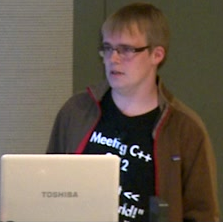biicode Dependency Manager released to Open Source
biicode just released the client code of their C++ Dependency Manager into OpenSource.
C/C++ Dependency Manager
From the Website:
biicode manages your project’s dependencies so you can use the libs you need (Curl, Catch, Fann, OpenSSL, OpenCV, POCO, Boost, Libuv, GTest ...) as you wish within your project. biicode uses CMake to configure and build your projects and it is compatible with many IDEs, version control systems and compilers.


 While we wait for CppCon 2015 in September, we’re featuring videos of some of the 100+ talks from CppCon 2014. Here is today’s feature:
While we wait for CppCon 2015 in September, we’re featuring videos of some of the 100+ talks from CppCon 2014. Here is today’s feature: Come see a nice product review:
Come see a nice product review: